This week's opening of the Royal Opera House production of Dialogues des Carmélites is a highlight of their season. Sir Simon Rattle conducts Robert Carsen's staging of Poulenc's opera based on the true story of the mass execution of Carmelite nuns during the French revolution. Carsen's production, seen all over the world since its Amsterdam premiere in 1997, dispenses with scenery and instead fills the stage with a seething mass of humanity – the populace, the revolutionary mob. This gives it the distinction of fielding the most people seen on stage in a Royal Opera production; its 167 participants just pip Die Meistersinger's 166. More intriguing than the sheer size of the cast, though, is its provenance.
While the orchestra and singers have enjoyed elite musical educations en route to becoming internationally accomplished musicians, for others in the production the road to the Covent Garden stage has been somewhat different. Celeste B – "You can say I'm 60-plus" – was previously homeless in London. A year ago, Michael B, 30, was serving a prison sentence for a firearms offence. Now they, and nearly 70 others – many of whom also have recent experience of homelessness, the criminal justice system or unemployment – have all made their Covent Garden debuts.
While outreach and education projects are commonplace in artistic institutions, this was slightly different. There has been no pre-production publicity and "there is no concession on quality," says Rattle. "This is a Royal Opera production and the same standards of excellence apply to the new members of the cast as to the professionals. But without telling the audience the backgrounds of the people on stage, I think that somehow they will sense that this is something a little different and these people do bring a different dramatic experience. The French revolution was about the real world impinging on another world that had become too isolated. There are obvious resonances. One of the most difficult things in opera is for people to suspend disbelief. What better way of putting the French revolution on stage than to bring in people who bring a whole new energy – sometimes not necessarily the most convenient energy – to the stage?"
The process of putting together the community ensemble began in January. It was a collaborative effort involving the charities Streetwise Opera, which uses music as a platform to help homeless people, the Synergy Theatre Project, which enables people who've been involved in crime to get into the dramatic arts, as well as Job Centre Plus, and students from the Central School of Speech and Drama.
"My late father once said to me that it's OK to be down on your luck, but so long as you are not out you can always find a handhold to pull yourself up," said Celeste B. "When I became homeless I went to St Martin in the Fields, where one of the staff asked if I wanted to go to a Streetwise opera workshop. I said, 'Not on your life.' I'd been told at school that I couldn't sing. But at Streetwise they said I was a natural alto, and I stayed. No matter how bad things are, they always could be worse. Streetwise was a good part of my life."
Michael B says that during his prison sentence he needed to find something he "loved and could commit to". As part of a day-release catering course, he was assigned to a job in the bar of Rada. "When I was there, some of the students and staff said to me that I was an actor, but that I just didn't realise it. Before prison, I had no experience of acting at all. But if I'm honest, I did use acting in my crimes. It was almost as if I was playing a character because I couldn't do it myself. In prison it was the same. You constantly have to adapt your character to different people and to different energies and situations. Say something wrong and things can escalate quickly."
After his release, he made contact with Synergy theatre who directed him in the Royal Opera project. He also started to audition for drama schools.
I've been following the progress of the community ensemble since the first of their weekly rehearsals together in February. The early warm-up exercises could have come straight from middle-management bonding sessions: sit with someone you don't know; do a yawn from the whole of your body; pretend you're trapped in a bubble. Rehearsing the stage movements, later to be named Big Mess 1 and Big Mess 2, resulted in much bumping into one another and general incompetence, the kind of scenes familiar to anyone who saw early episodes of Gareth Malone's The Choir. Art and practicalities got equal billing, with announcements about free travel cards delivered alongside news of costume fittings.
When Kasper Holten, Covent Garden's director of opera, welcomed the group to the house, he subtly raised the stakes by describing the eminence of the performers with whom the group would be working. He then outlined the philosophy of the scheme. "If you're ever somewhere new and want to find the city centre, look for the opera house. They are always in the very centre. But too often there is a sense of losing touch with the city, and part of the reasoning behind this programme is to reconnect with the city we are part of."
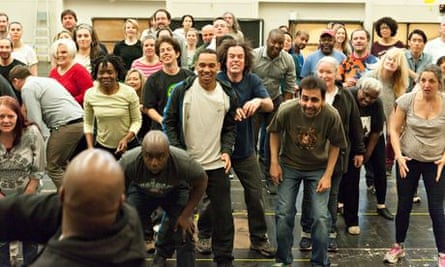
A month or so later, the camaraderie had grown almost palpably. Theatrical groans greeted the announcement that a tube strike would mean an early finish and therefore no tea break, while the phrase "You are a revolting mob" was still getting big laughs. The focus of the sessions was sharper, too. The group was told that, as the crowd, they were witnesses to, and participants in, the end of an era. Much of the instruction was about maintaining concentration in long scenes. "It is not just those at the front communicating with people in the stalls," the group was told. "The people at the back will be in communication with the circle and above. You will all be seen at all times. You cannot relax." Hitting marks on the right note had become much more important, while requests for silence from the production staff had a slightly testier edge.
Speaking after this rehearsal, assistant director Hazel Gould, who has worked with many community groups, said she was pleasantly surprised at how well the ensemble had come together. "What is unusual here is the disparate backgrounds. We had no idea how that would pan out, but it does feel like a company, and they are being very supportive of each other. My main anxiety is the interface between this group and the rest of the building. This is a well-oiled machine. It works incredibly well, and this project will involve a big change in working methods. Our next rehearsal is with the chorus and professional actors, so I am fascinated, excited and scared about seeing what happens when everyone comes together."
Royal Opera Chorus member John Bernays concedes there was some apprehension on the part of the professionals. "There are the logistical issues of having a group that size in the building, let alone in rehearsals. And having amateurs with little or no experience on a professional stage is something very unusual. Just being able to walk on and inhabit the same space every time is something we take for granted, but it actually can be tricky. Yet there was also a feeling that the project could be valuable to them, interesting for us and of course good for the piece. And just looking around the stage at their body language and presence, it is obvious that they get it and are really enjoying it."
There was indeed a new atmosphere in the vast rehearsal room when they began to work with the chorus and principals. Members of Carsen's production team prowled the floor offering instructions. The space felt slightly less safe than it had been when only Gould was telling them what to do; asking a simple question took slightly more courage. The group's swaying and circling movements – not synchronised, but giving the impression of the huge cast as a single character – were tightened up as they were told to think about "maggots in a jar" and "sharks swimming in a draining tank". Any extraneous chat was instantly shushed.
"You can make the rehearsal room as safe and supportive an experience as possible," said Gould, "but ultimately they will have to step on to the stage, and that is what you really prepare for. In a way it's a bit of an unknown quantity as to how it will go, but I do trust this group. While I think some people will be absolutely terrified, and pushed far out of their comfort zone, I don't think that we will end up with anyone screaming on the stage."
The test of that came with the full dress rehearsal before a packed house. There was clearly raised tension as I walked with the ensemble through the darkened wings, listening to the hubbub of the audience just a few feet away on the other side of the curtain. They lined up, as they had so many times before in rehearsal, but this time it was for real. As the lights went down, they walked forward to fill the stage – from front of house it looks as if the crowd stretches back forever – and the show began. From my vantage point, it all seemed to go as planned. The swaying and circling looked good, they parted on cue, and, most importantly, entered and exited on time and in character.
"I came here as a child because my uncle was a tailor in the wardrobe department," said Braithwaite at the interval. "So I can't believe I've now performed on the stage of the Royal Opera House. It was fantastic. And far too much was going on for me to be nervous."
"It was very humbling to be in front of so many people," said Michael B. "Because of the life I have lived I have been in some very tense situations, and I wasn't actually nervous. It was a feeling of excitement and maybe that's why I have taken to this."
When the project ends, Covent Garden will ask the participants if there are areas of theatrical work that interest them. Some work experience opportunities have been ringfenced.
Streetwise and Synergy theatre hope the experience will create new possibilities for the participants in all aspects of their lives. They already have their first success story. Last weekend, Michael B was at Rada for a final audition. "I signed up for the Royal Opera project because I thought it would give me experience of how a theatre actually works," he explains. "But I never dreamed it would work out like this. My audition went well. A year ago, I was in prison and had never acted in my life. In September, I will start to study at the Royal Academy of Dramatic Art."
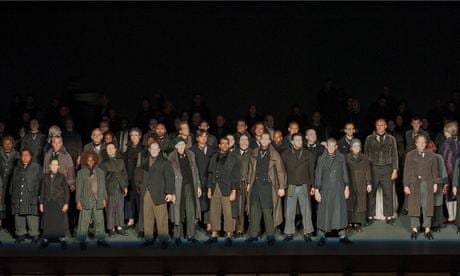
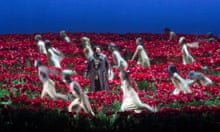
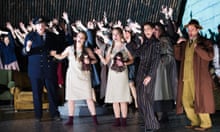

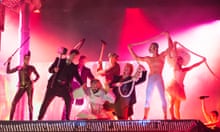
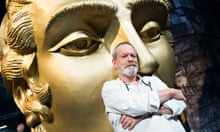
Comments (…)
Sign in or create your Guardian account to join the discussion